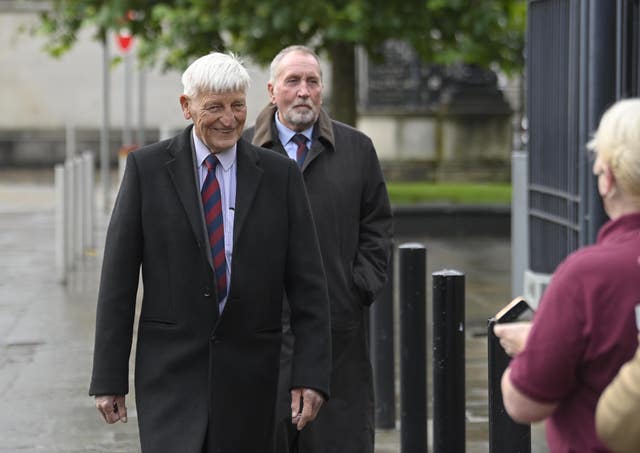
Boris Johnson has said he wants to bring to an end the cycle where people are brought to court “with no new evidence” for offences relating to Northern Ireland’s troubled past.
The Prime Minister was speaking days after the death of veteran Dennis Hutchings while he was in Belfast to face a charge of attempted murder over a fatal shooting incident almost 50 years ago.
He pleaded not guilty to the attempted murder of John Pat Cunningham in Co Tyrone in 1974.
The 80-year-old former soldier, who had underlying health conditions, died on Monday after contracting Covid-19.
His solicitor Philip Barden said he hopes the Government will now enact a statute of limitations on Troubles prosecutions in Northern Ireland, and said this should be known as Dennis’ Law.

Northern Ireland’s Public Prosecution Service has defended its decision to prosecute Mr Hutchings, saying it was taken after an impartial and independent application of the test for prosecution.
In July, the Government announced plans for a statute of limitations that would end all prosecutions for Troubles incidents up to April 1998.
The proposals, which would stop prosecutions of both veterans and former terrorists for Troubles offences, has been widely opposed by victims groups and political parties.
Speaking during a visit to a school in Co Antrim during a one day visit to Northern Ireland, Mr Johnson described “the case of Dennis Hutchings” as “really tragic”.
“I felt very, very sad for him and for all his family because this is the issue that we have been trying to address,” he said.

“Now, this particular case started before this Government came in, so no matter what we did we wouldn’t have been able to stop that one.
“But what we want to do is to try to tell the story of what has happened in the Troubles and to try to bring as much reconciliation and understanding as possible.
“But to bring an end to the endless cycle by which people are being brought to court with no new evidence for things that have been tried and heard many, many years ago.
“That is the thing that I think people want to end and we want to find a solution that brings people together, allows people to grieve, but also allows people to move on.”


Why are you making commenting on The National only available to subscribers?
We know there are thousands of National readers who want to debate, argue and go back and forth in the comments section of our stories. We’ve got the most informed readers in Scotland, asking each other the big questions about the future of our country.
Unfortunately, though, these important debates are being spoiled by a vocal minority of trolls who aren’t really interested in the issues, try to derail the conversations, register under fake names, and post vile abuse.
So that’s why we’ve decided to make the ability to comment only available to our paying subscribers. That way, all the trolls who post abuse on our website will have to pay if they want to join the debate – and risk a permanent ban from the account that they subscribe with.
The conversation will go back to what it should be about – people who care passionately about the issues, but disagree constructively on what we should do about them. Let’s get that debate started!
Callum Baird, Editor of The National
Comments: Our rules
We want our comments to be a lively and valuable part of our community - a place where readers can debate and engage with the most important local issues. The ability to comment on our stories is a privilege, not a right, however, and that privilege may be withdrawn if it is abused or misused.
Please report any comments that break our rules.
Read the rules here